QUT BSB111: Business Law and Ethics Case Study - Ethical Frameworks
VerifiedAdded on 2022/08/25
|7
|1920
|20
Case Study
AI Summary
This case study analyzes an ethical dilemma faced by a manager in a smoothie shop concerning an employee's job performance and a potential job offer from a competitor. The assignment explores the ethical dilemma of whether the manager should provide a glowing reference to the competitor, potentially saving the company's reputation and the employee's future, even if the employee was not a good performer. The analysis employs three ethical frameworks: utilitarianism, Kantian ethics, and Aristotle's virtue ethics, to evaluate the situation and propose a course of action. Utilitarianism suggests providing the reference to maximize overall wellness, Kantian ethics emphasizes the decision-making process, and virtue ethics highlights honesty as the key principle. The recommended solution is to provide the glowing reference, balancing the interests of the company, the employee, and the owner. The assignment concludes that this approach aligns with ethical principles and promotes a positive outcome.
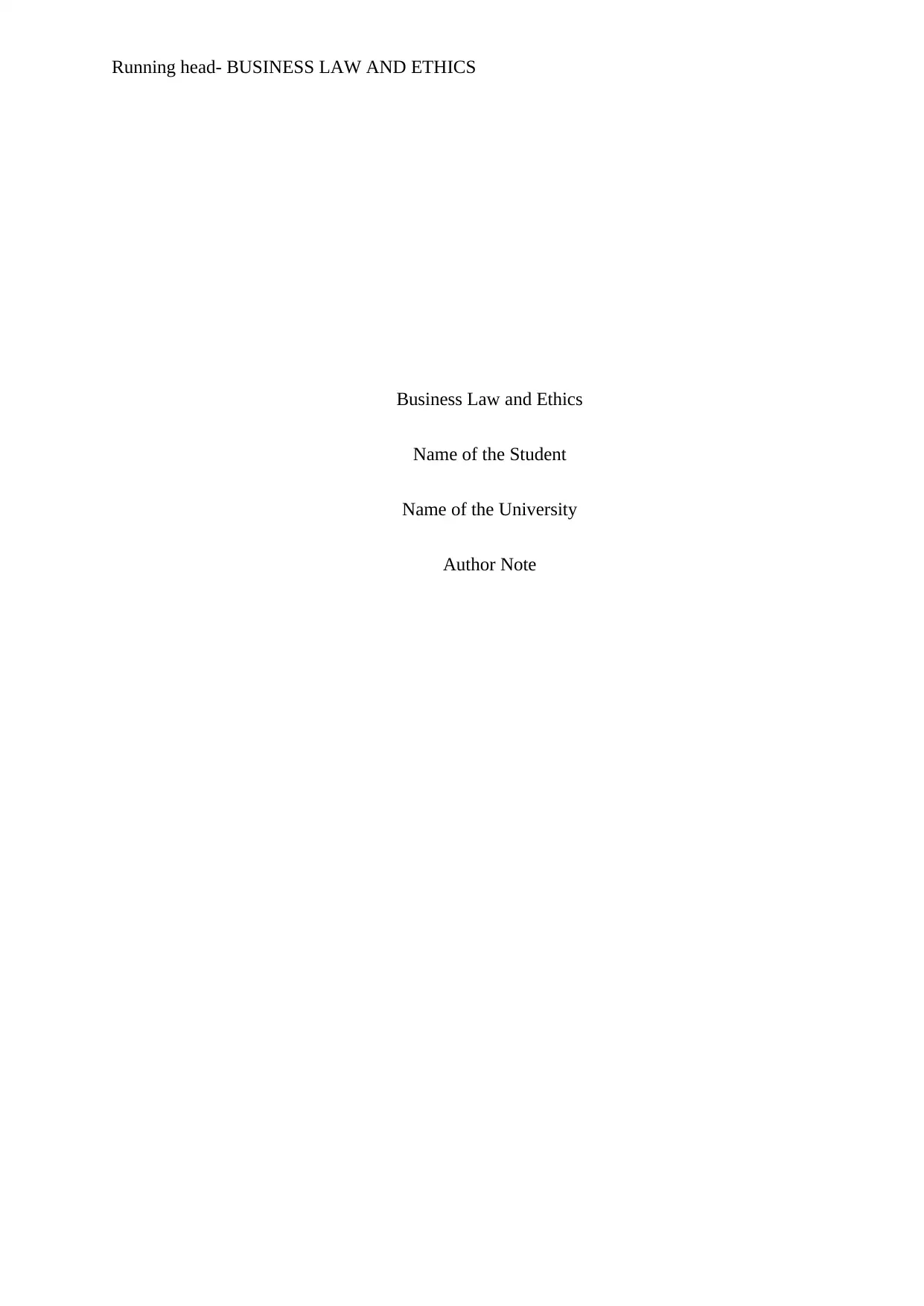
Running head- BUSINESS LAW AND ETHICS
Business Law and Ethics
Name of the Student
Name of the University
Author Note
Business Law and Ethics
Name of the Student
Name of the University
Author Note
Paraphrase This Document
Need a fresh take? Get an instant paraphrase of this document with our AI Paraphraser
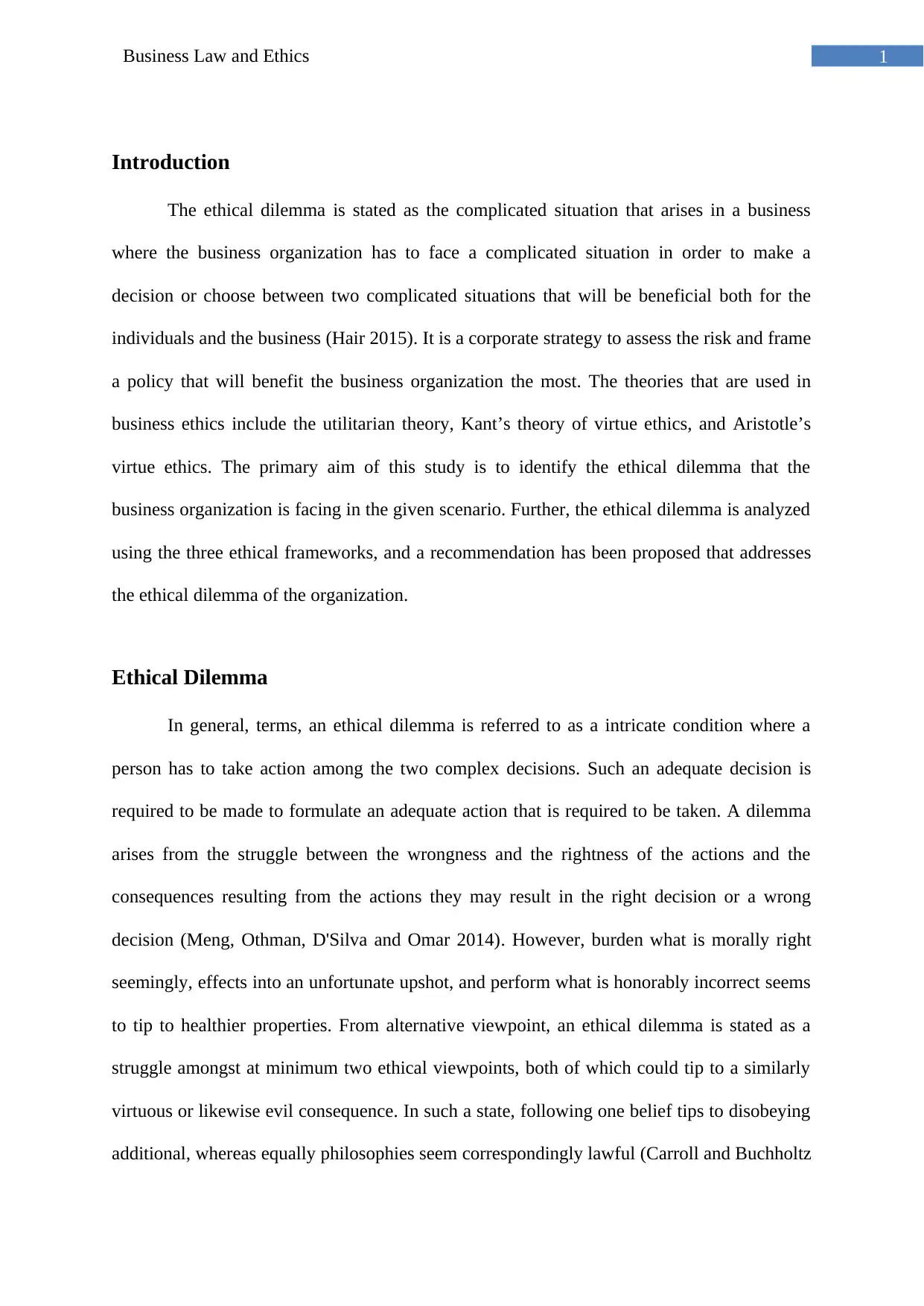
1Business Law and Ethics
Introduction
The ethical dilemma is stated as the complicated situation that arises in a business
where the business organization has to face a complicated situation in order to make a
decision or choose between two complicated situations that will be beneficial both for the
individuals and the business (Hair 2015). It is a corporate strategy to assess the risk and frame
a policy that will benefit the business organization the most. The theories that are used in
business ethics include the utilitarian theory, Kant’s theory of virtue ethics, and Aristotle’s
virtue ethics. The primary aim of this study is to identify the ethical dilemma that the
business organization is facing in the given scenario. Further, the ethical dilemma is analyzed
using the three ethical frameworks, and a recommendation has been proposed that addresses
the ethical dilemma of the organization.
Ethical Dilemma
In general, terms, an ethical dilemma is referred to as a intricate condition where a
person has to take action among the two complex decisions. Such an adequate decision is
required to be made to formulate an adequate action that is required to be taken. A dilemma
arises from the struggle between the wrongness and the rightness of the actions and the
consequences resulting from the actions they may result in the right decision or a wrong
decision (Meng, Othman, D'Silva and Omar 2014). However, burden what is morally right
seemingly, effects into an unfortunate upshot, and perform what is honorably incorrect seems
to tip to healthier properties. From alternative viewpoint, an ethical dilemma is stated as a
struggle amongst at minimum two ethical viewpoints, both of which could tip to a similarly
virtuous or likewise evil consequence. In such a state, following one belief tips to disobeying
additional, whereas equally philosophies seem correspondingly lawful (Carroll and Buchholtz
Introduction
The ethical dilemma is stated as the complicated situation that arises in a business
where the business organization has to face a complicated situation in order to make a
decision or choose between two complicated situations that will be beneficial both for the
individuals and the business (Hair 2015). It is a corporate strategy to assess the risk and frame
a policy that will benefit the business organization the most. The theories that are used in
business ethics include the utilitarian theory, Kant’s theory of virtue ethics, and Aristotle’s
virtue ethics. The primary aim of this study is to identify the ethical dilemma that the
business organization is facing in the given scenario. Further, the ethical dilemma is analyzed
using the three ethical frameworks, and a recommendation has been proposed that addresses
the ethical dilemma of the organization.
Ethical Dilemma
In general, terms, an ethical dilemma is referred to as a intricate condition where a
person has to take action among the two complex decisions. Such an adequate decision is
required to be made to formulate an adequate action that is required to be taken. A dilemma
arises from the struggle between the wrongness and the rightness of the actions and the
consequences resulting from the actions they may result in the right decision or a wrong
decision (Meng, Othman, D'Silva and Omar 2014). However, burden what is morally right
seemingly, effects into an unfortunate upshot, and perform what is honorably incorrect seems
to tip to healthier properties. From alternative viewpoint, an ethical dilemma is stated as a
struggle amongst at minimum two ethical viewpoints, both of which could tip to a similarly
virtuous or likewise evil consequence. In such a state, following one belief tips to disobeying
additional, whereas equally philosophies seem correspondingly lawful (Carroll and Buchholtz
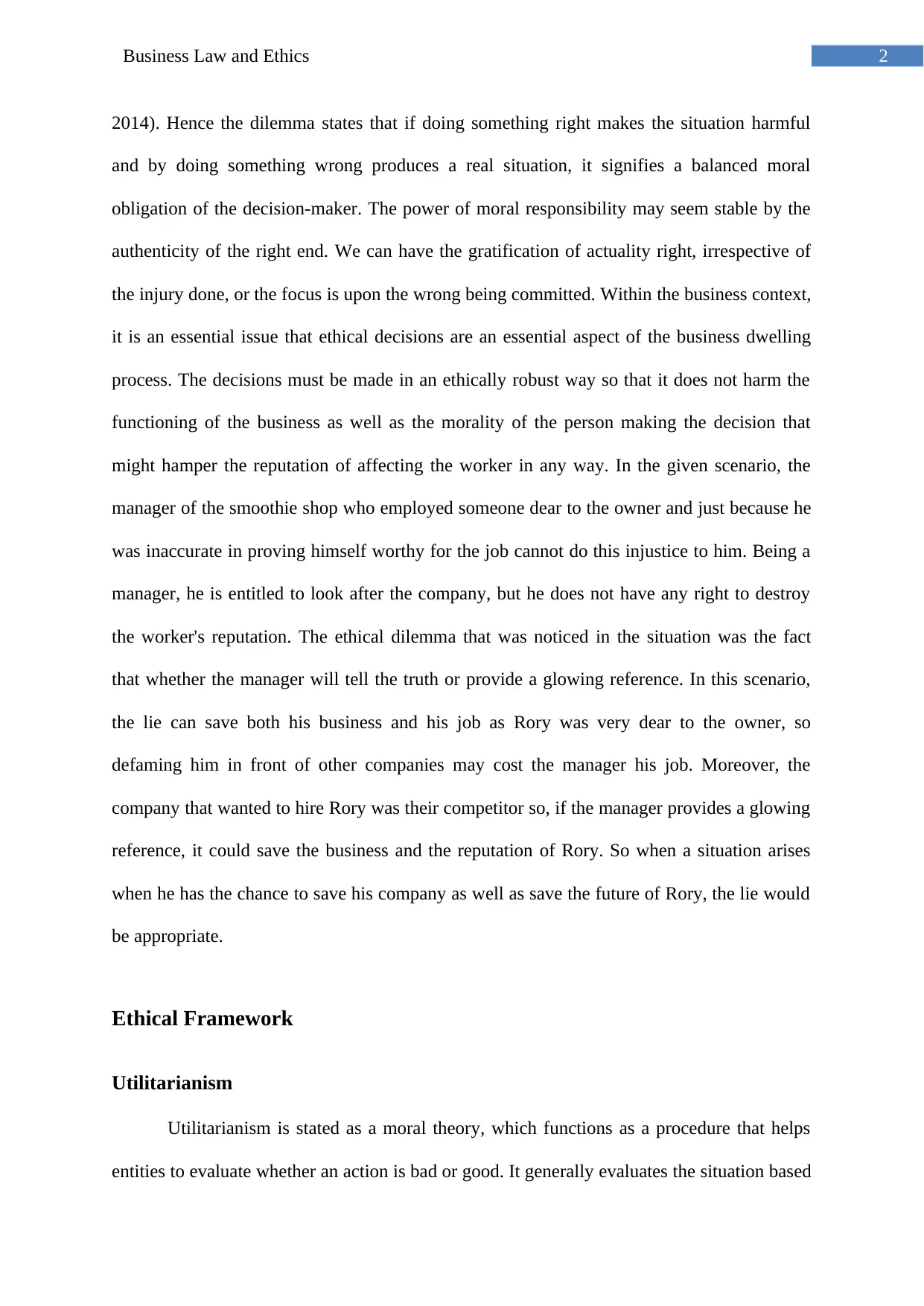
2Business Law and Ethics
2014). Hence the dilemma states that if doing something right makes the situation harmful
and by doing something wrong produces a real situation, it signifies a balanced moral
obligation of the decision-maker. The power of moral responsibility may seem stable by the
authenticity of the right end. We can have the gratification of actuality right, irrespective of
the injury done, or the focus is upon the wrong being committed. Within the business context,
it is an essential issue that ethical decisions are an essential aspect of the business dwelling
process. The decisions must be made in an ethically robust way so that it does not harm the
functioning of the business as well as the morality of the person making the decision that
might hamper the reputation of affecting the worker in any way. In the given scenario, the
manager of the smoothie shop who employed someone dear to the owner and just because he
was inaccurate in proving himself worthy for the job cannot do this injustice to him. Being a
manager, he is entitled to look after the company, but he does not have any right to destroy
the worker's reputation. The ethical dilemma that was noticed in the situation was the fact
that whether the manager will tell the truth or provide a glowing reference. In this scenario,
the lie can save both his business and his job as Rory was very dear to the owner, so
defaming him in front of other companies may cost the manager his job. Moreover, the
company that wanted to hire Rory was their competitor so, if the manager provides a glowing
reference, it could save the business and the reputation of Rory. So when a situation arises
when he has the chance to save his company as well as save the future of Rory, the lie would
be appropriate.
Ethical Framework
Utilitarianism
Utilitarianism is stated as a moral theory, which functions as a procedure that helps
entities to evaluate whether an action is bad or good. It generally evaluates the situation based
2014). Hence the dilemma states that if doing something right makes the situation harmful
and by doing something wrong produces a real situation, it signifies a balanced moral
obligation of the decision-maker. The power of moral responsibility may seem stable by the
authenticity of the right end. We can have the gratification of actuality right, irrespective of
the injury done, or the focus is upon the wrong being committed. Within the business context,
it is an essential issue that ethical decisions are an essential aspect of the business dwelling
process. The decisions must be made in an ethically robust way so that it does not harm the
functioning of the business as well as the morality of the person making the decision that
might hamper the reputation of affecting the worker in any way. In the given scenario, the
manager of the smoothie shop who employed someone dear to the owner and just because he
was inaccurate in proving himself worthy for the job cannot do this injustice to him. Being a
manager, he is entitled to look after the company, but he does not have any right to destroy
the worker's reputation. The ethical dilemma that was noticed in the situation was the fact
that whether the manager will tell the truth or provide a glowing reference. In this scenario,
the lie can save both his business and his job as Rory was very dear to the owner, so
defaming him in front of other companies may cost the manager his job. Moreover, the
company that wanted to hire Rory was their competitor so, if the manager provides a glowing
reference, it could save the business and the reputation of Rory. So when a situation arises
when he has the chance to save his company as well as save the future of Rory, the lie would
be appropriate.
Ethical Framework
Utilitarianism
Utilitarianism is stated as a moral theory, which functions as a procedure that helps
entities to evaluate whether an action is bad or good. It generally evaluates the situation based
⊘ This is a preview!⊘
Do you want full access?
Subscribe today to unlock all pages.

Trusted by 1+ million students worldwide
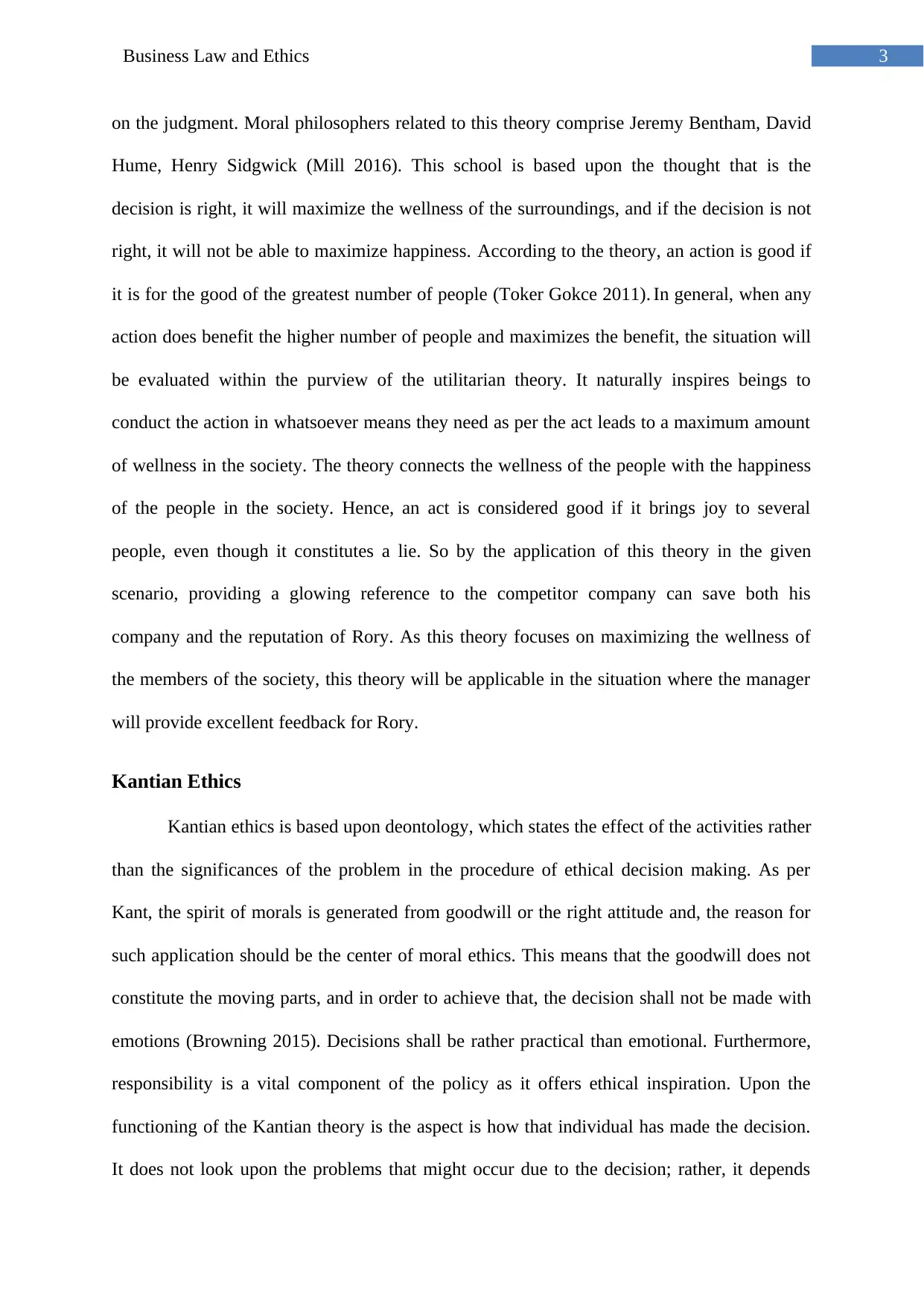
3Business Law and Ethics
on the judgment. Moral philosophers related to this theory comprise Jeremy Bentham, David
Hume, Henry Sidgwick (Mill 2016). This school is based upon the thought that is the
decision is right, it will maximize the wellness of the surroundings, and if the decision is not
right, it will not be able to maximize happiness. “According to the theory, an action is good if
it is for the good of the greatest number of people (Toker Gokce 2011).” In general, when any
action does benefit the higher number of people and maximizes the benefit, the situation will
be evaluated within the purview of the utilitarian theory. It naturally inspires beings to
conduct the action in whatsoever means they need as per the act leads to a maximum amount
of wellness in the society. The theory connects the wellness of the people with the happiness
of the people in the society. Hence, an act is considered good if it brings joy to several
people, even though it constitutes a lie. So by the application of this theory in the given
scenario, providing a glowing reference to the competitor company can save both his
company and the reputation of Rory. As this theory focuses on maximizing the wellness of
the members of the society, this theory will be applicable in the situation where the manager
will provide excellent feedback for Rory.
Kantian Ethics
Kantian ethics is based upon deontology, which states the effect of the activities rather
than the significances of the problem in the procedure of ethical decision making. As per
Kant, the spirit of morals is generated from goodwill or the right attitude and, the reason for
such application should be the center of moral ethics. This means that the goodwill does not
constitute the moving parts, and in order to achieve that, the decision shall not be made with
emotions (Browning 2015). Decisions shall be rather practical than emotional. Furthermore,
responsibility is a vital component of the policy as it offers ethical inspiration. Upon the
functioning of the Kantian theory is the aspect is how that individual has made the decision.
It does not look upon the problems that might occur due to the decision; rather, it depends
on the judgment. Moral philosophers related to this theory comprise Jeremy Bentham, David
Hume, Henry Sidgwick (Mill 2016). This school is based upon the thought that is the
decision is right, it will maximize the wellness of the surroundings, and if the decision is not
right, it will not be able to maximize happiness. “According to the theory, an action is good if
it is for the good of the greatest number of people (Toker Gokce 2011).” In general, when any
action does benefit the higher number of people and maximizes the benefit, the situation will
be evaluated within the purview of the utilitarian theory. It naturally inspires beings to
conduct the action in whatsoever means they need as per the act leads to a maximum amount
of wellness in the society. The theory connects the wellness of the people with the happiness
of the people in the society. Hence, an act is considered good if it brings joy to several
people, even though it constitutes a lie. So by the application of this theory in the given
scenario, providing a glowing reference to the competitor company can save both his
company and the reputation of Rory. As this theory focuses on maximizing the wellness of
the members of the society, this theory will be applicable in the situation where the manager
will provide excellent feedback for Rory.
Kantian Ethics
Kantian ethics is based upon deontology, which states the effect of the activities rather
than the significances of the problem in the procedure of ethical decision making. As per
Kant, the spirit of morals is generated from goodwill or the right attitude and, the reason for
such application should be the center of moral ethics. This means that the goodwill does not
constitute the moving parts, and in order to achieve that, the decision shall not be made with
emotions (Browning 2015). Decisions shall be rather practical than emotional. Furthermore,
responsibility is a vital component of the policy as it offers ethical inspiration. Upon the
functioning of the Kantian theory is the aspect is how that individual has made the decision.
It does not look upon the problems that might occur due to the decision; rather, it depends
Paraphrase This Document
Need a fresh take? Get an instant paraphrase of this document with our AI Paraphraser
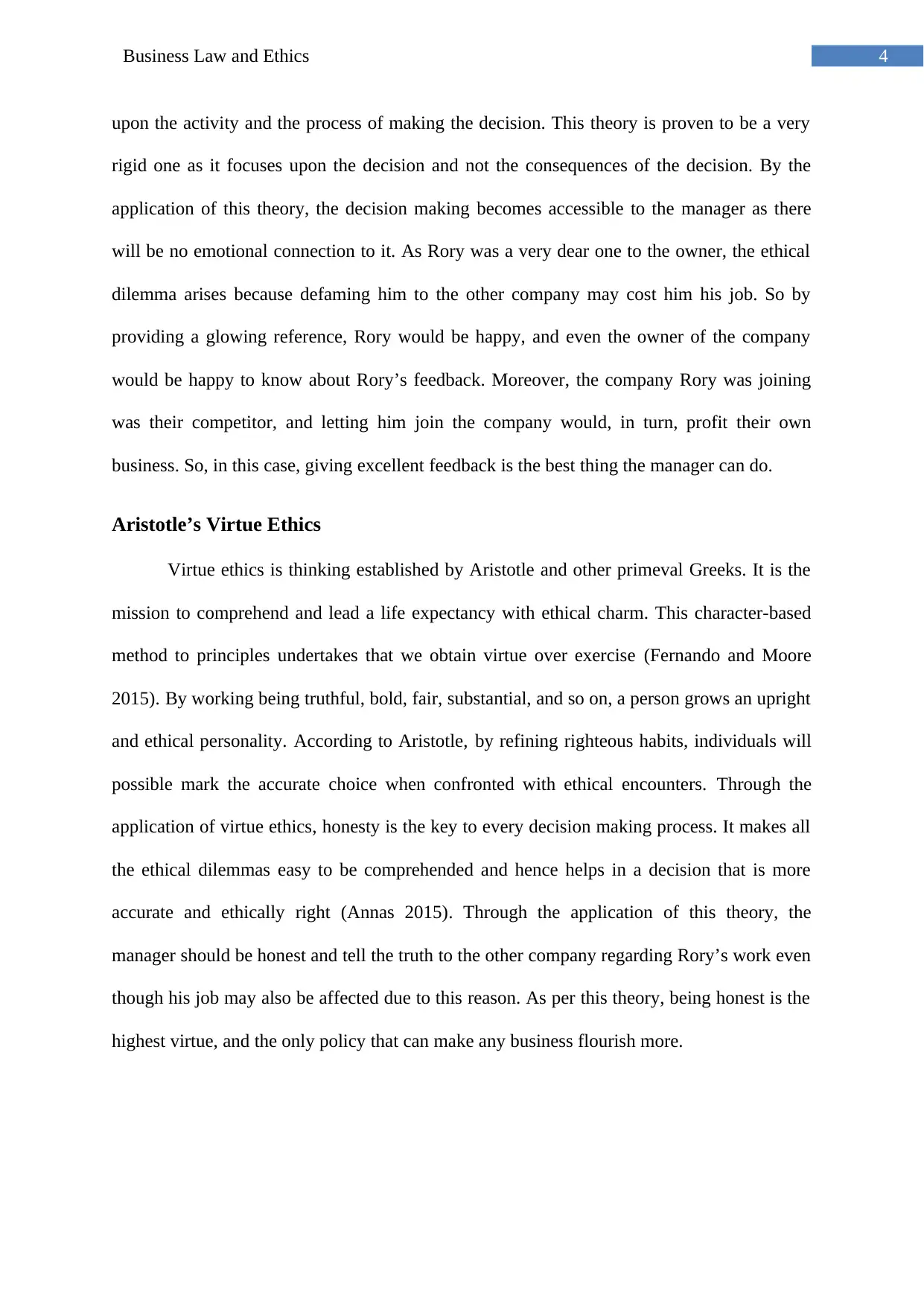
4Business Law and Ethics
upon the activity and the process of making the decision. This theory is proven to be a very
rigid one as it focuses upon the decision and not the consequences of the decision. By the
application of this theory, the decision making becomes accessible to the manager as there
will be no emotional connection to it. As Rory was a very dear one to the owner, the ethical
dilemma arises because defaming him to the other company may cost him his job. So by
providing a glowing reference, Rory would be happy, and even the owner of the company
would be happy to know about Rory’s feedback. Moreover, the company Rory was joining
was their competitor, and letting him join the company would, in turn, profit their own
business. So, in this case, giving excellent feedback is the best thing the manager can do.
Aristotle’s Virtue Ethics
Virtue ethics is thinking established by Aristotle and other primeval Greeks. It is the
mission to comprehend and lead a life expectancy with ethical charm. This character-based
method to principles undertakes that we obtain virtue over exercise (Fernando and Moore
2015). “By working being truthful, bold, fair, substantial, and so on, a person grows an upright
and ethical personality.” According to Aristotle, “by refining righteous habits, individuals will
possible mark the accurate choice when confronted with ethical encounters.” Through the
application of virtue ethics, honesty is the key to every decision making process. It makes all
the ethical dilemmas easy to be comprehended and hence helps in a decision that is more
accurate and ethically right (Annas 2015). Through the application of this theory, the
manager should be honest and tell the truth to the other company regarding Rory’s work even
though his job may also be affected due to this reason. As per this theory, being honest is the
highest virtue, and the only policy that can make any business flourish more.
upon the activity and the process of making the decision. This theory is proven to be a very
rigid one as it focuses upon the decision and not the consequences of the decision. By the
application of this theory, the decision making becomes accessible to the manager as there
will be no emotional connection to it. As Rory was a very dear one to the owner, the ethical
dilemma arises because defaming him to the other company may cost him his job. So by
providing a glowing reference, Rory would be happy, and even the owner of the company
would be happy to know about Rory’s feedback. Moreover, the company Rory was joining
was their competitor, and letting him join the company would, in turn, profit their own
business. So, in this case, giving excellent feedback is the best thing the manager can do.
Aristotle’s Virtue Ethics
Virtue ethics is thinking established by Aristotle and other primeval Greeks. It is the
mission to comprehend and lead a life expectancy with ethical charm. This character-based
method to principles undertakes that we obtain virtue over exercise (Fernando and Moore
2015). “By working being truthful, bold, fair, substantial, and so on, a person grows an upright
and ethical personality.” According to Aristotle, “by refining righteous habits, individuals will
possible mark the accurate choice when confronted with ethical encounters.” Through the
application of virtue ethics, honesty is the key to every decision making process. It makes all
the ethical dilemmas easy to be comprehended and hence helps in a decision that is more
accurate and ethically right (Annas 2015). Through the application of this theory, the
manager should be honest and tell the truth to the other company regarding Rory’s work even
though his job may also be affected due to this reason. As per this theory, being honest is the
highest virtue, and the only policy that can make any business flourish more.
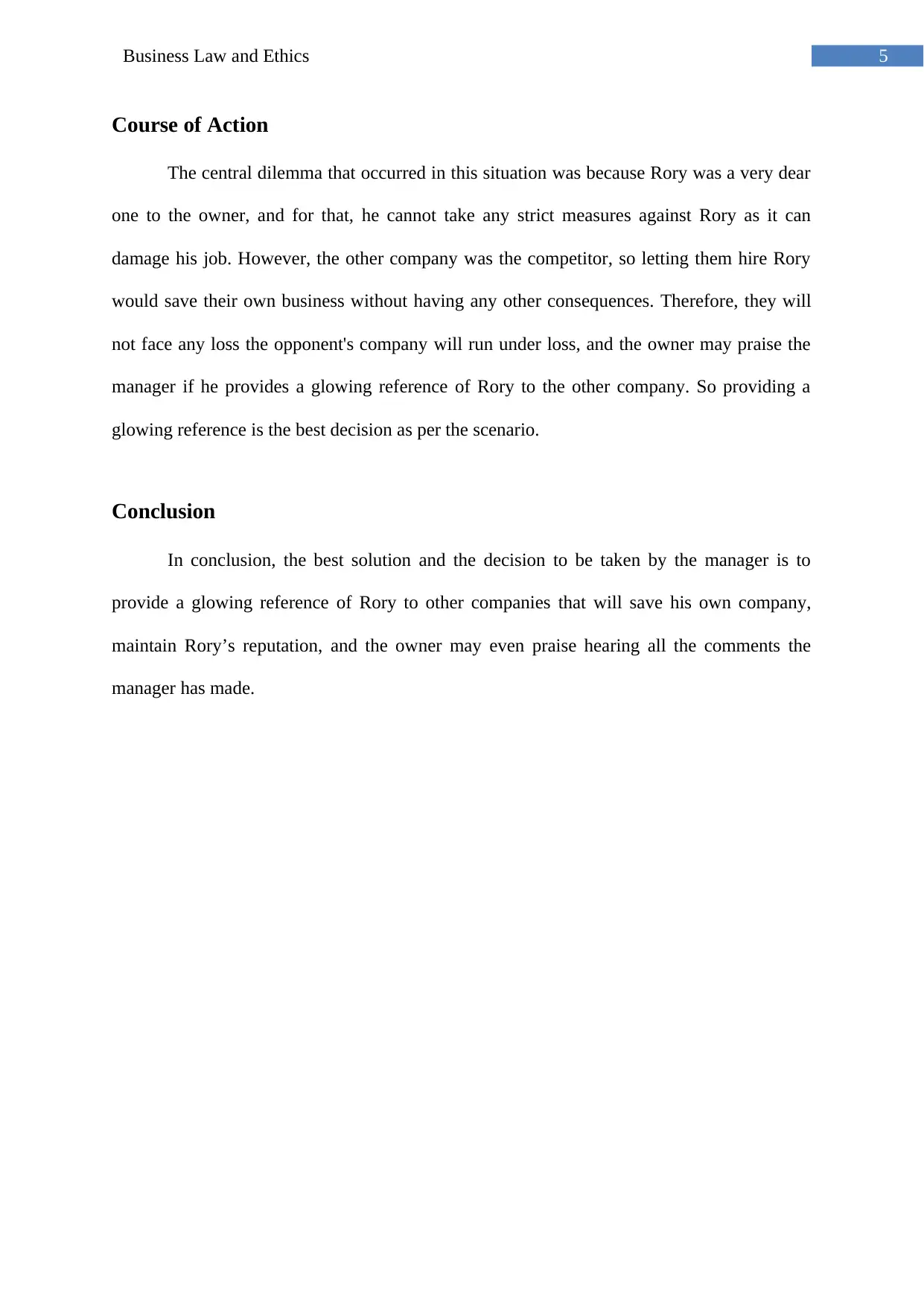
5Business Law and Ethics
Course of Action
The central dilemma that occurred in this situation was because Rory was a very dear
one to the owner, and for that, he cannot take any strict measures against Rory as it can
damage his job. However, the other company was the competitor, so letting them hire Rory
would save their own business without having any other consequences. Therefore, they will
not face any loss the opponent's company will run under loss, and the owner may praise the
manager if he provides a glowing reference of Rory to the other company. So providing a
glowing reference is the best decision as per the scenario.
Conclusion
In conclusion, the best solution and the decision to be taken by the manager is to
provide a glowing reference of Rory to other companies that will save his own company,
maintain Rory’s reputation, and the owner may even praise hearing all the comments the
manager has made.
Course of Action
The central dilemma that occurred in this situation was because Rory was a very dear
one to the owner, and for that, he cannot take any strict measures against Rory as it can
damage his job. However, the other company was the competitor, so letting them hire Rory
would save their own business without having any other consequences. Therefore, they will
not face any loss the opponent's company will run under loss, and the owner may praise the
manager if he provides a glowing reference of Rory to the other company. So providing a
glowing reference is the best decision as per the scenario.
Conclusion
In conclusion, the best solution and the decision to be taken by the manager is to
provide a glowing reference of Rory to other companies that will save his own company,
maintain Rory’s reputation, and the owner may even praise hearing all the comments the
manager has made.
⊘ This is a preview!⊘
Do you want full access?
Subscribe today to unlock all pages.

Trusted by 1+ million students worldwide
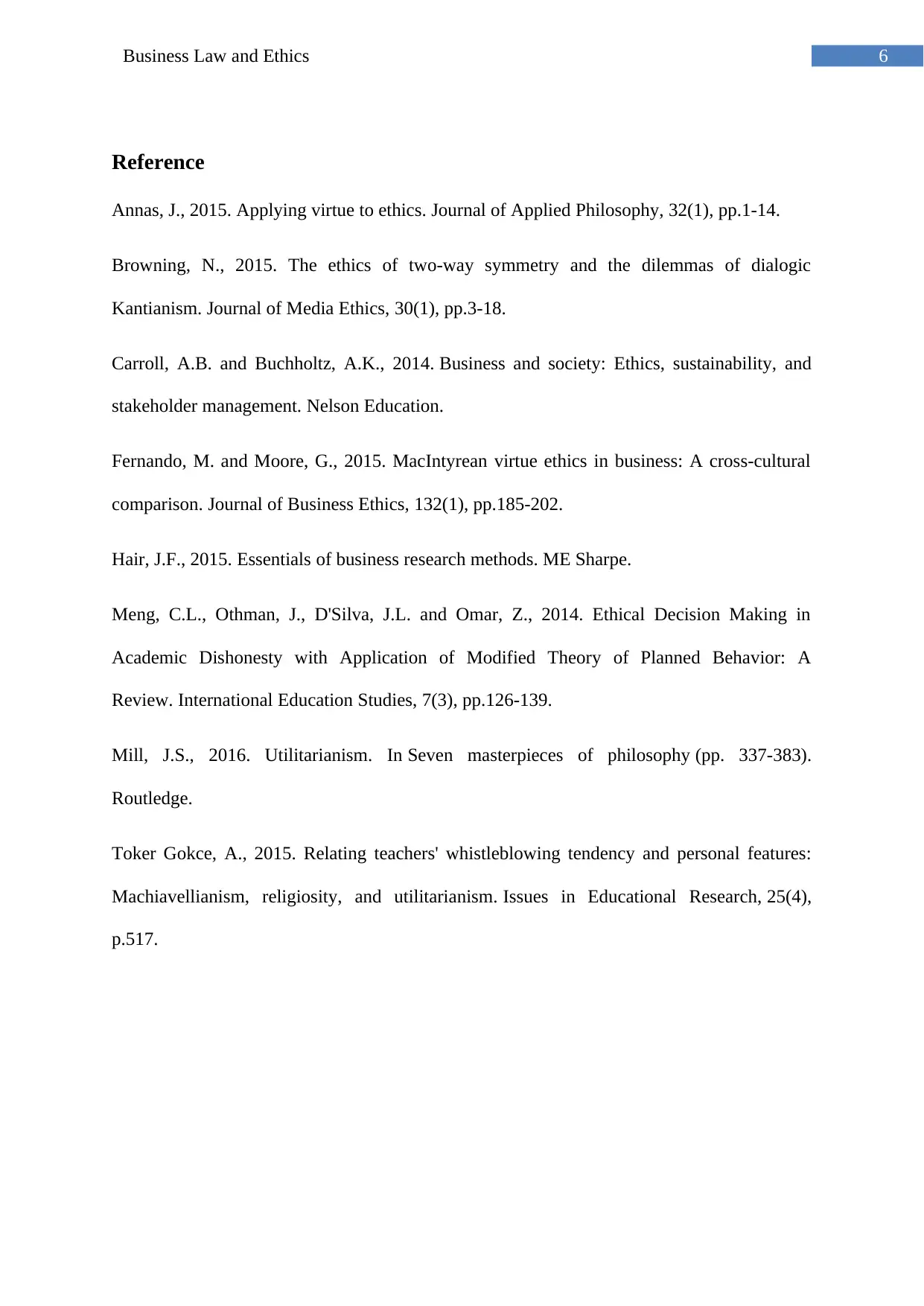
6Business Law and Ethics
Reference
Annas, J., 2015. Applying virtue to ethics. Journal of Applied Philosophy, 32(1), pp.1-14.
Browning, N., 2015. The ethics of two-way symmetry and the dilemmas of dialogic
Kantianism. Journal of Media Ethics, 30(1), pp.3-18.
Carroll, A.B. and Buchholtz, A.K., 2014. Business and society: Ethics, sustainability, and
stakeholder management. Nelson Education.
Fernando, M. and Moore, G., 2015. MacIntyrean virtue ethics in business: A cross-cultural
comparison. Journal of Business Ethics, 132(1), pp.185-202.
Hair, J.F., 2015. Essentials of business research methods. ME Sharpe.
Meng, C.L., Othman, J., D'Silva, J.L. and Omar, Z., 2014. Ethical Decision Making in
Academic Dishonesty with Application of Modified Theory of Planned Behavior: A
Review. International Education Studies, 7(3), pp.126-139.
Mill, J.S., 2016. Utilitarianism. In Seven masterpieces of philosophy (pp. 337-383).
Routledge.
Toker Gokce, A., 2015. Relating teachers' whistleblowing tendency and personal features:
Machiavellianism, religiosity, and utilitarianism. Issues in Educational Research, 25(4),
p.517.
Reference
Annas, J., 2015. Applying virtue to ethics. Journal of Applied Philosophy, 32(1), pp.1-14.
Browning, N., 2015. The ethics of two-way symmetry and the dilemmas of dialogic
Kantianism. Journal of Media Ethics, 30(1), pp.3-18.
Carroll, A.B. and Buchholtz, A.K., 2014. Business and society: Ethics, sustainability, and
stakeholder management. Nelson Education.
Fernando, M. and Moore, G., 2015. MacIntyrean virtue ethics in business: A cross-cultural
comparison. Journal of Business Ethics, 132(1), pp.185-202.
Hair, J.F., 2015. Essentials of business research methods. ME Sharpe.
Meng, C.L., Othman, J., D'Silva, J.L. and Omar, Z., 2014. Ethical Decision Making in
Academic Dishonesty with Application of Modified Theory of Planned Behavior: A
Review. International Education Studies, 7(3), pp.126-139.
Mill, J.S., 2016. Utilitarianism. In Seven masterpieces of philosophy (pp. 337-383).
Routledge.
Toker Gokce, A., 2015. Relating teachers' whistleblowing tendency and personal features:
Machiavellianism, religiosity, and utilitarianism. Issues in Educational Research, 25(4),
p.517.
1 out of 7
Related Documents
Your All-in-One AI-Powered Toolkit for Academic Success.
+13062052269
info@desklib.com
Available 24*7 on WhatsApp / Email
![[object Object]](/_next/static/media/star-bottom.7253800d.svg)
Unlock your academic potential
Copyright © 2020–2026 A2Z Services. All Rights Reserved. Developed and managed by ZUCOL.





